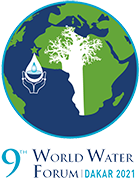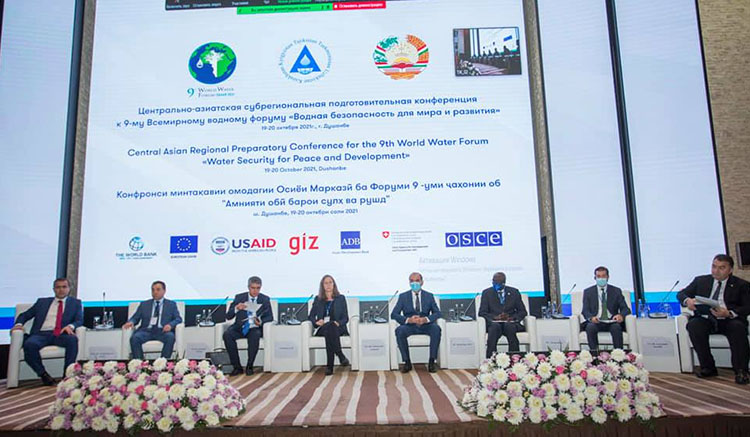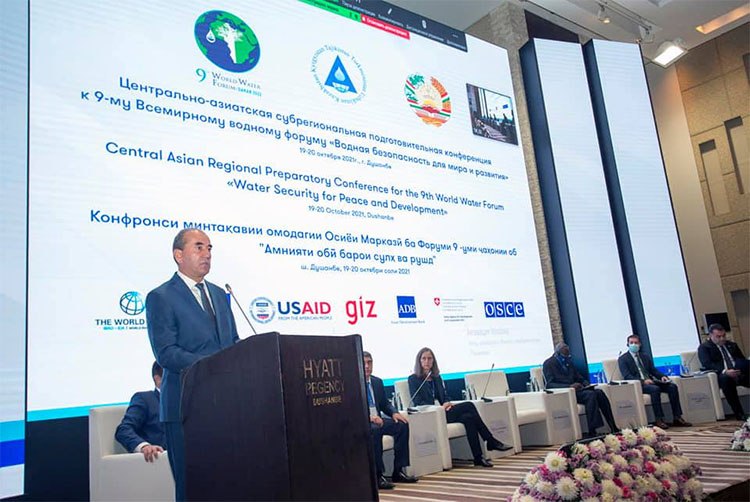Central Asian Sub-regional Preparatory Conference (Dushanbe, Tajikistan, 19-20 October 2021)

The Central Asian Regional Preparatory Conference for the 9th World Water Forum “Water Security for Peace and Development” was held in Dushanbe from 19 to 20 October 2021, pursuant to the decision of the Board of the International Fund for Saving the Aral Sea of 29 June 2021 on preparations for the 9th World Water Forum.
The Conference aims to identify and discuss the focus of regional processes and key themes to be presented for dialogue at the 9th Forum, formulate and agree on a regional agenda for the 9th World Water Forum in accordance with its priority topics and the most important issues for the Central Asian region, and strengthen regional cooperation and partnerships at all levels to promote the implementation of the International Decade for Action “Water for Sustainable Development”, 2018-2028.

The conference consisted of six thematic sessions in the context of the Sustainable Development Goals:
1. Ensure universal access to safe water and adequate sanitation to respond to new challenges, including COVID-19.
2. Transboundary water cooperation for sustainable development.
3. Effective water resources management for increasing agricultural production and provide employment opportunities in rural areas.
4. Water, Energy and Food nexus.
5. Climate change adaptation and water related disaster risk reduction.
6. Financing the water sector.

The Conference was attended by the representatives of Governments, representatives of the water sector and other stakeholders in Central Asia, the World Water Council, the Secretariat of the 9th World Water Forum, international and regional organizations, international financing institutions, NGOs, civil society, academia, experts and other interested parties.
Resolution
of participants of the Central Asian Sub-regional Preparatory Conference for the 9th World Water Forum “Water Security for Peace and Development”
We, the participants of the Central Asian Sub-regional Preparatory Conference for the 9th World Water Forum, representing governments, international and regional organizations, UN agencies, financial institutions, civil society and other stakeholders of the sub-region:
considering the importance of preparing an agreed Central Asian agenda for the 9th World Water Forum, making a worthy contribution to this global event and to the UN Water Conference to be held in New York City on March 22-24, 2023;
bearing in mind the key role assigned to sustainable development, peace and security, given to efficient management of water, energy and other natural resources at all levels, developed water management, energy, transport and other infrastructure to cope with growing challenges for sustainable development, peace and security in the Central Asian sub-region;
noting the transboundary nature of major watercourses in the sub-region, common socio-economic and environmental problems amid increasing water scarcity and competing water uses, impacts of climate change, degradation of ecosystems and risks of water-related disasters;
recognizing the positive contribution to ensuring water security and cooperation in the sub-region by existing bilateral and multilateral agreements, regional organizations and advanced approaches in national legislations;
underlining the different level of economic development and advancing reforms, the importance of improving the legal framework, information exchange, integration processes, as well as expanding and strengthening effective mechanisms of water cooperation and diplomacy, especially at transboundary level, including through measures to mitigate the Aral Sea environmental disaster of planetary scale, adaptation to climate change as well as other new challenges, including the COVID-19 pandemic;
emphasizing the importance of improving access to safe drinking water and sanitation for the population of the sub-region, which is an essential and necessary prerequisite for achieving the SDGs and the goals of the International Decade for Action "Water for Sustainable Development" 2018-2028, maintaining health and a decent quality of life;
stressing the importance of the agreements reached as a result of the Consultative Meeting of the Heads of States of Central Asia, held on August 6, 2021 in Turkmenbashi, Turkmenistan, especially on issues related to the activities of IFAS, including the importance of ongoing work to improve the IFAS organizational structure and legal framework taking into account the interests and participation of all Central Asian States;
noting the adoption by the IFAS Board on June 29, 2021 in Dushanbe, Republic of Tajikistan, of the Aral Sea Basin Program (ASBP-4), which is the basis for the governments of the sub-region, IFAS structural divisions and development partners to develop and implement projects aimed at improving the water, environmental and socio-economic situation in the Aral Sea Basin;
having discussed in the context of existing and potential water problems and risks of the Central Asian sub-region the priorities of the 9th World Water Forum (water security and sanitation; cooperation; water for rural development; tools and instruments), which require intensified actions to achieve the goals and targets on water contained in the 2030 Agenda for Sustainable Development:
noted the following:
- Not all people in Central Asia have access to safe drinking water and adequate sanitation, especially in rural areas and in the social sphere. Providing safe drinking water in sufficient quantity for everyone and reliable water disposal systems (sewerage, wastewater treatment), especially taking into account COVID-19 pandemic control, should become the highest priority issues in national development strategies and programs, basin water management plans;
- existing problems in the Aral Sea basin as well as new global and regional challenges require urgent adaptation responses in the countries of the sub-region in order to achieve resilience to their negative impacts. Among these challenges amid population growth and increasing water consumption, the most alarming and requiring adequate measures are climate change causing intensive melting of glaciers and reduction of water reserves, deterioration of water quality, water- related natural disasters, degradation of irrigated lands, drainage systems and ecosystems in general;
- Integrated Water Resources Management (IWRM) is an important tool for effectively linking different types of water use, rational use of water resources and achievement of water, food, energy and environmental security. Central Asian countries are moving towards transition to IWRM and making efforts to implement it using successful experience and best practices of other countries and river basins. Full-scale implementation of IWRM principles, especially regarding drinking water supply, wastewater disposal and sanitation in general, hydropower, industrial water supply and its waste management, water conservation, land reclamation, water recreation development, requires considerable human, financial and technical resources, legal regulation and appropriate institutional mechanisms;
- water use for green development can be stimulated by linking economic, social and environmental aspects of water with the application of new financial and economic mechanisms, innovative technologies and infrastructure in all areas of its application in order to curb increasing negative impacts and pressures on water resources;
- reconstruction and modernization of outdated water infrastructure and hydrotechnical facilities being under construction on transboundary watercourses automation and digitalization are important tasks for achieving sustainable development and efficient water management and provision of water services;
- improvement of water and land productivity, including reduction of areas under water-intensive crops in favor of plants using less water in all countries of the sub-region should be considered as a priority for agricultural sector development;
- for effective transboundary water management it is necessary to improve existing and develop new forms and tools of cooperation, strengthening dialogue, mutual understanding and responsible partnership;
- effective and coordinated implementation of ASBP-4 will make a worthy contribution to solving existing water, energy, climate, environmental, socio-economic and other problems in the countries of the region;
- improvement of the IFAS institutional structure and legal framework will contribute to creation of sustainable and effective regional institutions and mechanisms able to adequately address existing problems and respond to new challenges and risks.
The conference participants, taking into account the above-mentioned as well as other main aspects of the discussions held at the plenary and thematic sessions, call on:
- the governments of Central Asian countries to make additional efforts to improve institutional and legal mechanisms, attract and apply progressive technologies and innovative approaches in water and environmental management, increase financing of water-related activities, as well as strengthen water cooperation;
- financial institutions, international organizations, donor countries and other development partners to provide all possible financial, technical and technological support to Central Asian countries to achieve sustainable development, including through active participation in the implementation of ASBP-4;
- representatives of private sector to assist in solving water problems and introducing green technologies, including by introducing alternative energy sources and attracting investments, in particular through the mechanism of public-private partnership;
- scientific/expert and civil communities to actively participate in discussions of water problems and generation of ideas, proposals to join efforts with governmental, private sectors and international organizations to solve them.
Conference participants also:
- fully agree and are ready to contribute to the efforts of the international community to successfully prepare and hold the UN Water Conference in 2023 to make it a turning point for water issues at all levels;
- call upon all stakeholders to continue consultations within the preparatory process for the 9th World Water Forum and in other international formats;
- considering the uniqueness of the platform of the 9th World Water Forum, invite the Organizing Committee to continue preparatory work in order to adequately represent Central Asia at the Forum and further contribute to solving water problems in the sub-region;
- call upon the Executive Committee of the International Fund for Saving the Aral Sea to finalize, taking into account discussions at the conference and subsequent consultations with all stakeholders, the draft position paper of the sub-region on priority themes of the 9th World Water Forum, presenting it as a side event at the Forum.
The conference participants express their gratitude to the Government of the Republic of Tajikistan for warm hospitality and the Executive Committee of the International Fund for Saving the Aral Sea, the Interstate Commission for Water Coordination, the Interstate Commission on Sustainable Development and other partners for organizing the conference at a high level and creating conditions for fruitful work.
Adopted October 20, 2021
Dushanbe, Republic of Tajikistan
Source: Executive Committee of the International Fund for Saving the Aral Sea
